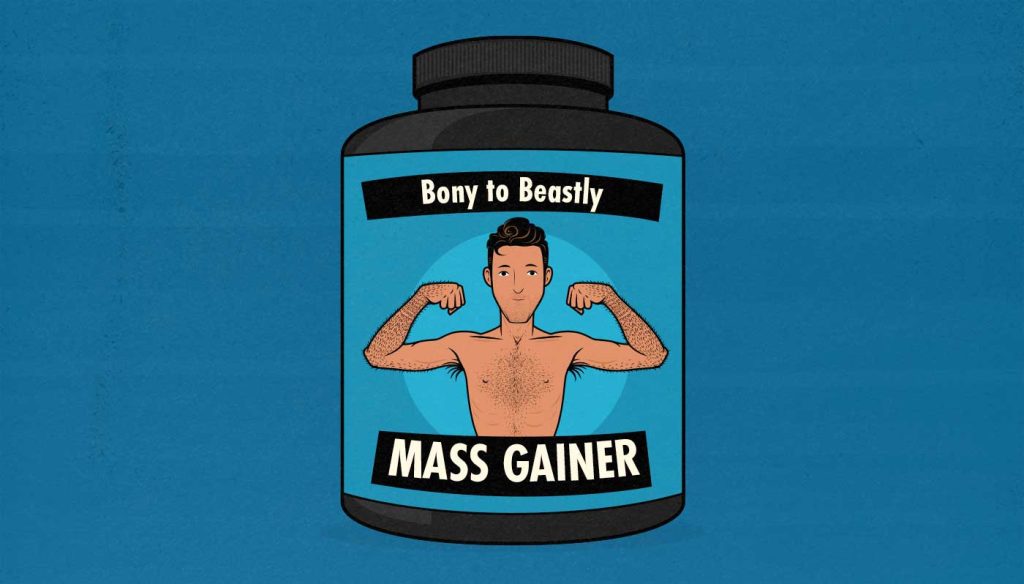
Should Skinny Guys Use Mass Gainers?
Mass gainers, also known as weight gainers, are popular with skinny guys trying to bulk up. They’re especially popular with “hardgainers” whose metabolisms make it difficult to gain weight. I’m a naturally skinny guy myself, and I’ve always found it nearly impossible to get into a sustainable calorie surplus.
I’ve experimented with my fair share of mass gainers. I’ve tried all the popular brands, I’ve made my own homemade shakes from whey protein and maltodextrin, and I’ve tried all sorts of thousand-calorie bulking shakes. That’s how I gained my first 50 pounds.
So, do mass gainers work? Are they healthy? Do they cause excess fat gain? And, if you’re a skinny guy struggling to gain weight, should you use them?
- Video Version
- What Are Mass Gainers?
- Do Mass Gainers Work?
- Mass Gainer Results
- Are Mass Gainers Healthy?
- What’s the Best Way to Use Mass Gainers?
- Do Weight Gainers Cause Excess Fat Gain?
- Are Mass Gainers Better than Real Food?
- Can You Have Mass Gainers Before Bed?
- Mass Gainers and Stomach Aches
- What’s the Best Mass Gainer?
- Summary
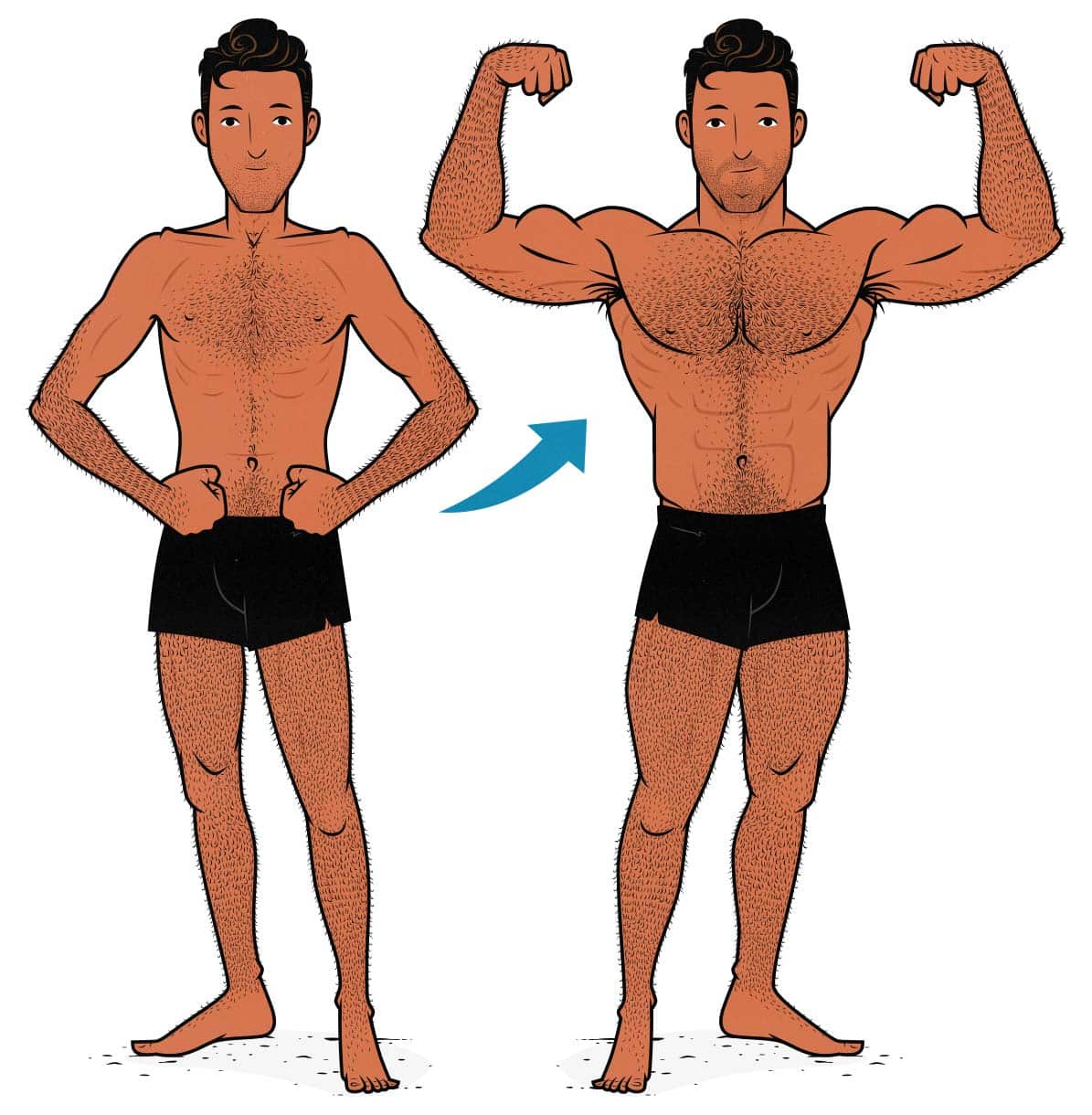
Video Version
If you’d rather watch than read, I made a five-minute video covering all the same points as the article:
I’m trying to gradually make videos for our most popular bulking articles, but there are also some videos unique to the YouTube channel. If you’d like an article or video on anything related to building muscle, let me know in the comments.
What Are Mass Gainers?
Mass gainers, sometimes referred to as weight gainers, are high-calorie shakes. A typical serving contains around 50 grams of protein and 250 grams of carbs, yielding 1200 calories overall… which is quite a lot!
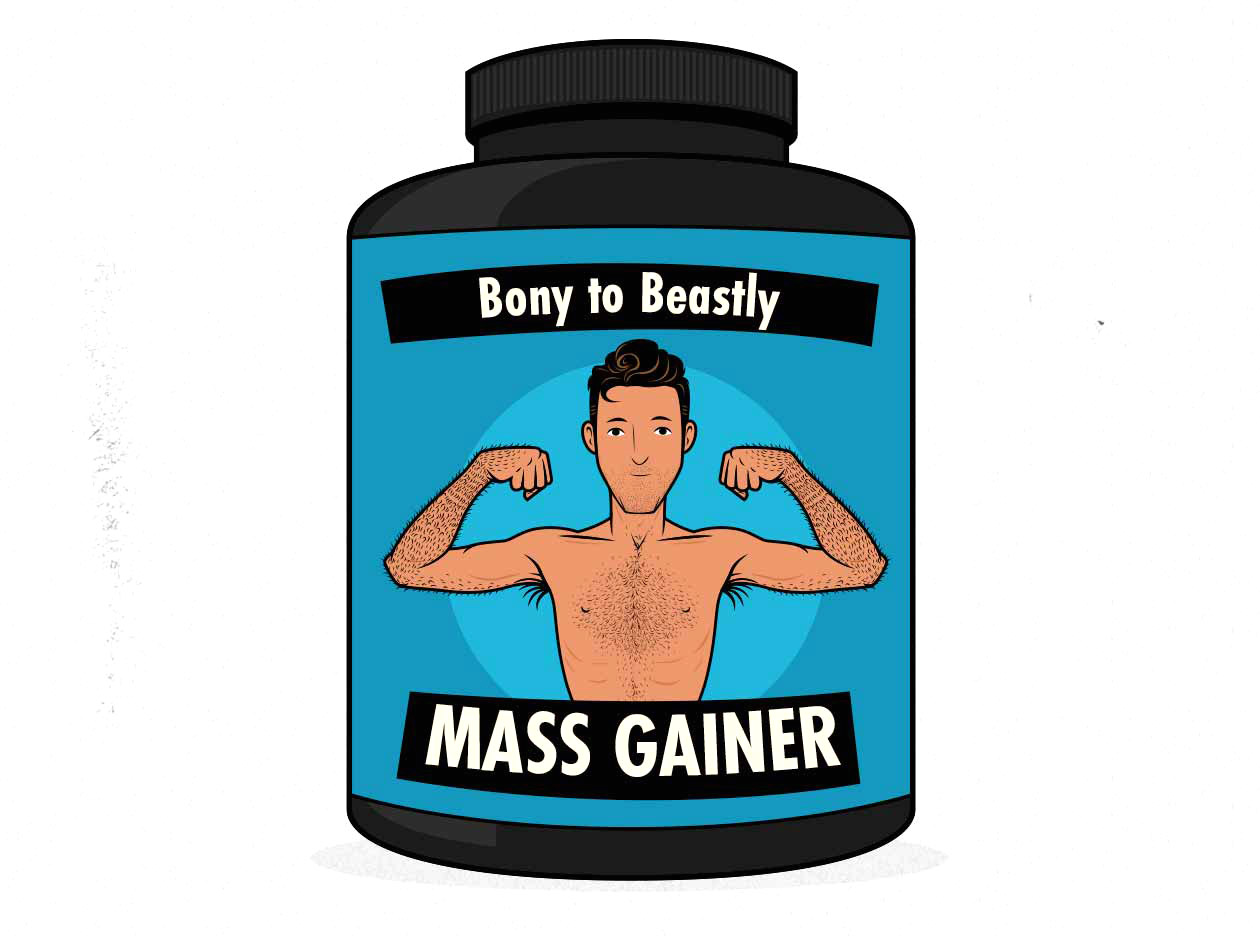
There are a wide variety of mass gainers containing a variety of different ingredients. Some use a blend of different protein powders. Others use ground-up oats instead of maltodextrin. Some include fats. Most of them lean heavily into protein and starchy carbs, though. Carbs are great for building muscle, so that’s usually a good thing.
Do Mass Gainers Work?
Mass gainers are fantastic for gaining weight and building muscle. They contain tons of easily digested calories, and those calories come from macros that are great for building muscle. (More on bulking macros here.)
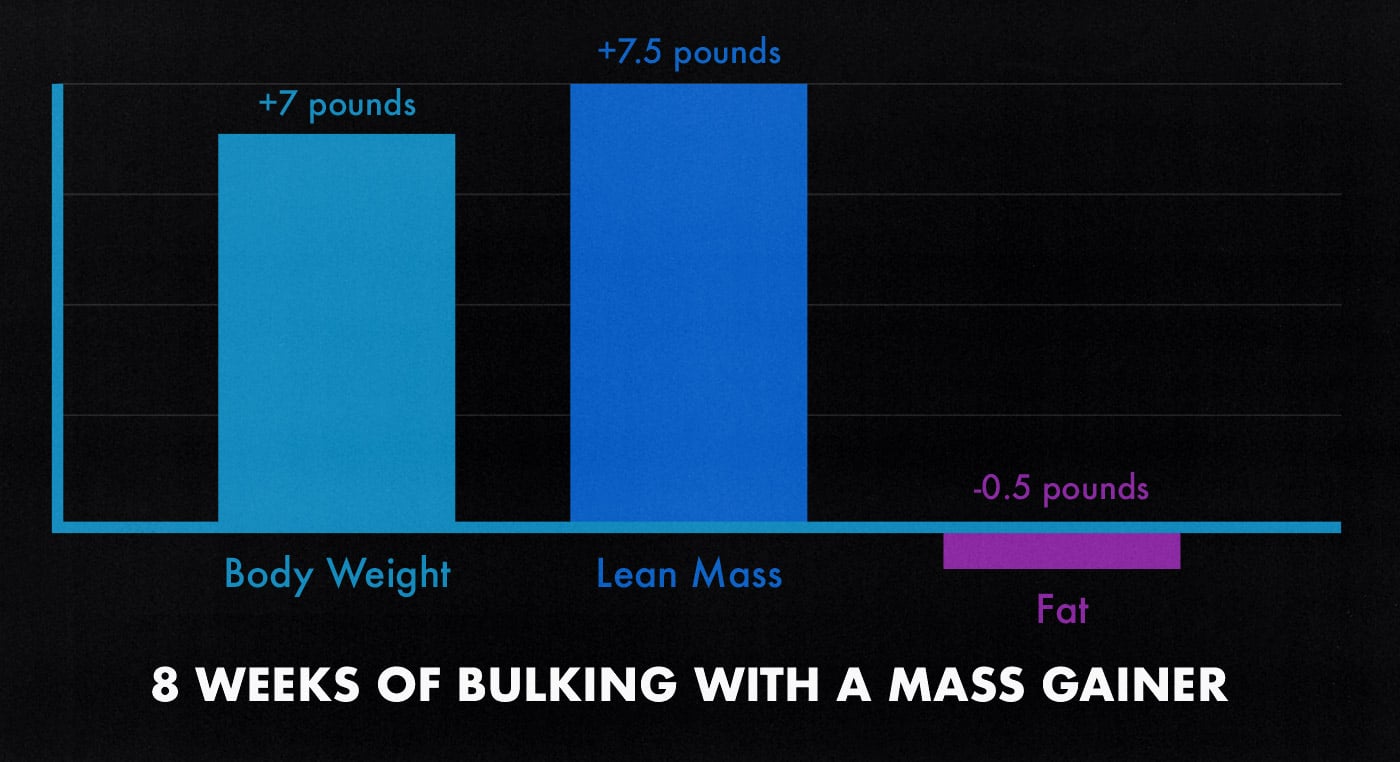
In a study by Rozenek and colleagues, men supplementing with maltodextrin and whey protein gained 7.5 pounds of muscle in 8 weeks while simultaneously losing a tiny bit of fat (study). Most of this muscle growth is thanks to the robust workout program, but even so, it shows that mass gainers are able to fuel rapid rates of muscle growth.
27–50 grams of whey protein is enough to create a nearly maximal spike in muscle-protein synthesis.
Maltodextrin is a starchy carb that’s nutritionally similar to pasta. It digests quickly and easily, it’s a good source of calories, and it’s the perfect type of carb for packing your muscles full of glycogen, which can speed up muscle growth (full explanation).
When you combine when and starchy carbs, you get a simple meal replacement that’s effortless to prepare and easy on your appetite, making it easier to eat enough calories to gain weight. That’s why mass gainers are so good for skinny guys: they’re an easy source of calories.
Mass Gainer Results
Here’s a photo of Jared getting his newbie gains, gaining 27 pounds in 4 months. He was doing three full-body workouts per week and having a mass gainer after every workout.
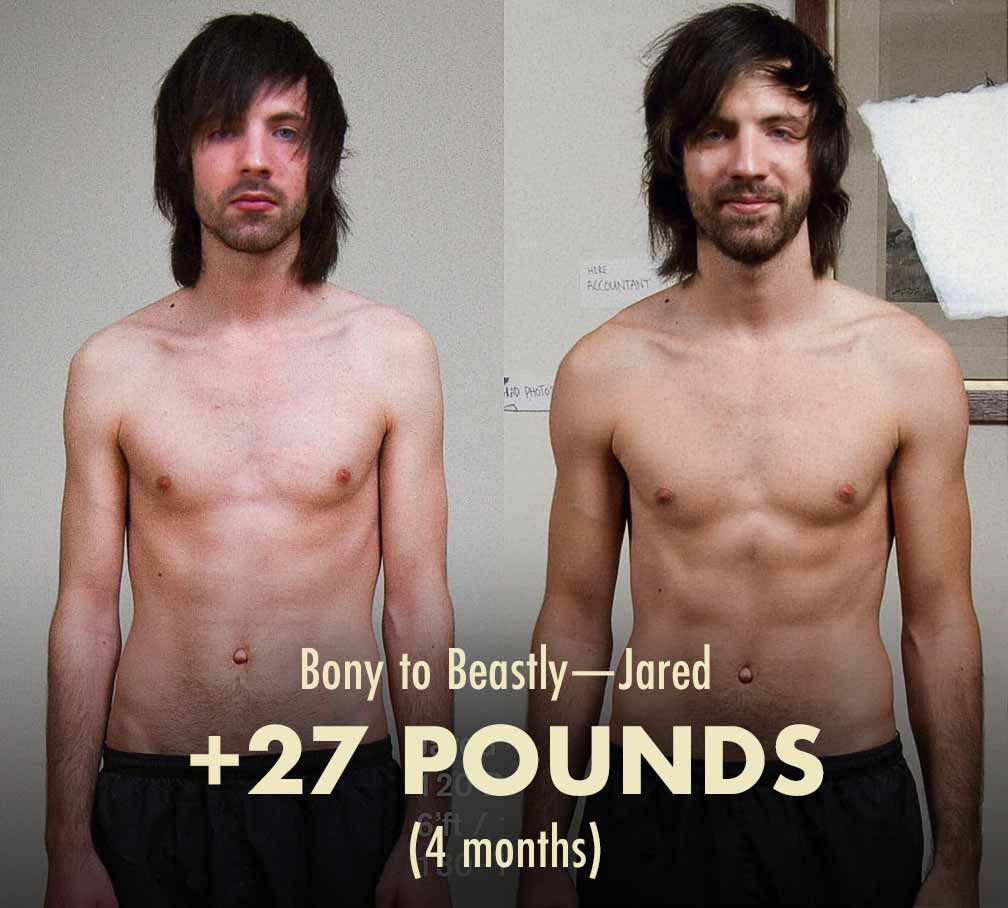
I’ve used mass gainers myself, too. And although I’ve always dreaded having to drink them, they helped me eat enough calories to build muscle. Here are some before and after photos from my second bulk, showing me going from 150 up to 175 pounds in 3 months while using a mass gainer:
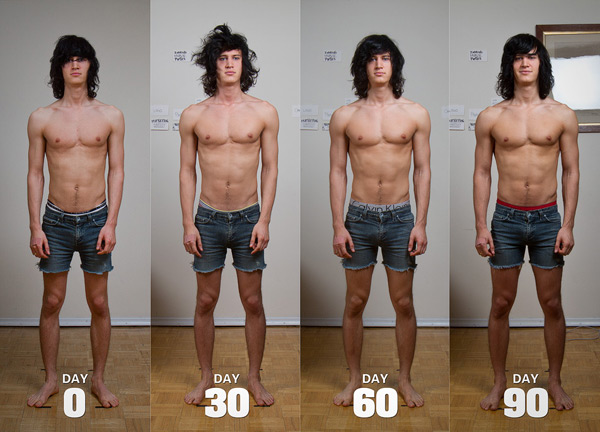
Since then, we’ve helped a little over 10,000 skinny guys bulk up, and we’ve always been open about the pros and cons of using mass gainers. Some guys choose to use them. Most don’t. It’s never noticeably affected their bulking results.
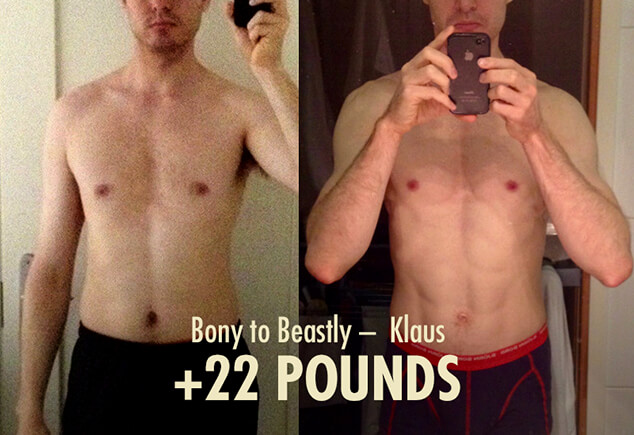
Sometimes guys make perfectly lean gains while supplementing with gainers. Other times guys gain too much fat from overeating whole foods. It’s not a major factor either way.
Are Mass Gainers Healthy?
Mass gainers are heavily processed and don’t contain many micronutrients. That means you’d need to get your micronutrients from the rest of your diet. That might not be a problem. If your regular diet is nutritious, and you add a mass gainer to get into a calorie surplus, then your diet is still rich in nutrients.
If your diet is already somewhat poor, you’re adding empty calories into a diet that’s already deficient. Better to take the opposite approach. Instead of supplementing with a mass gainer, blend up a high-calorie bulking smoothie. Blending doesn’t reduce the nutritional value of food, so blending up healthy foods is a really easy way to eat a better diet.
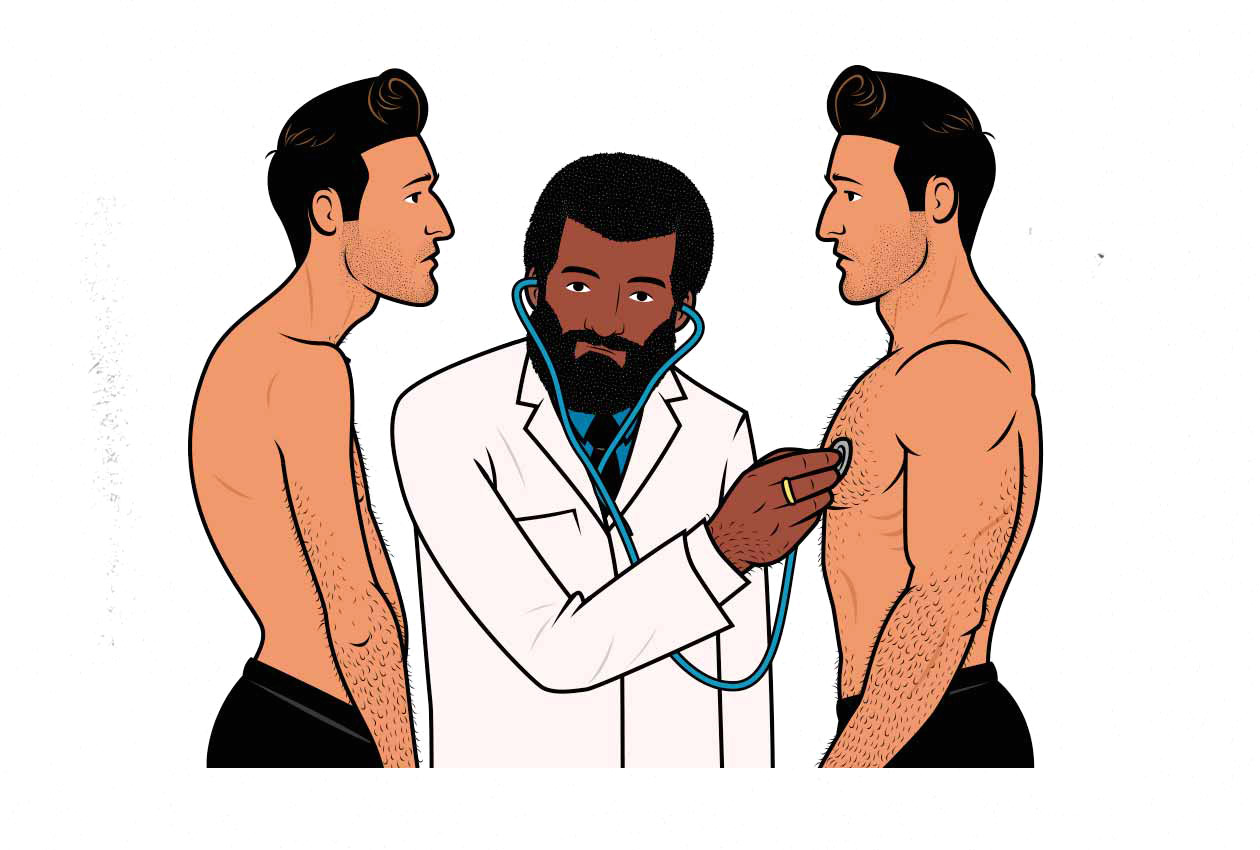
The other thing to keep in mind is that going from being skinny to being strong and muscular is a huge boon to our general health. Building muscle, gaining strength, and habitually lifting weights are all incredibly healthy. If a weight gainer helps you make progress, it can be a net positive.
In my case, all of my health markers improved while bulking, even though I was getting a significant portion of my calories from weight gainers. However, nowadays, I prefer getting my extra calories from whole foods. If I’m falling behind on calories, I’ll blend up a high-calorie shake.
What’s the Best Way to Use Mass Gainers?
As a general rule of thumb, a skinny beginner might want to gain 0.5–1 pound per week (full explanation). If you’re struggling to gain weight consistently, try consuming a mass gainer after every workout. If that’s still not moving the scale up, try consuming a mass gainer on rest days, too. If that’s still not working, you might enjoy our article on how to eat more calories.
The benefit of having your mass gainers after working out is twofold:
- That “anabolic post-workout window” is overhyped but rooted in truth. Right after you work out is a great time to have a protein shake, a big bulking meal, or a mass gainer.
- After working out, a lot of skinny guys find it hard to eat a big meal. Maybe that’s because they need to change, shower, and then head home from the gym. Maybe it’s because their pre-workout supplement blunted their appetite. Or maybe lifting kills their appetite for a couple of hours. Sipping on a mass gainer while training and then chugging what’s left at the end ensures that we’re not falling behind on calories.
The real trick with mass gainers is to make sure you aren’t gaining weight too quickly. If you’re gaining 0.5–1 pound per week, no problem. But if you’re gaining much more than that, especially for more than a week or two in a row, you might want to slow things down. It’s not that the weight gainer itself is fattening; it’s just that you’re consuming too many calories overall and gaining weight too fast.
Do Weight Gainers Cause Excess Fat Gain?
Mass gainers won’t cause extra fat gain if you’re not consuming too many calories overall. The serving sizes are quite large, though, and mass gainers tend to be quite easy on the appetite, so it’s common for people to overdo it. That isn’t because the mass gainers are fattening, but rather because they’re consuming too many calories.
Are Mass Gainers Better than Real Food?
It’s better to get more of your calories from whole foods. There are plenty of great bulking foods that make great alternatives to mass gainers. We have a list of them in this article.
Mass gainers don’t have any special muscle-building advantages; they’re just an easy source of calories that aren’t very filling. They’re a useful tool for people who struggle to gain weight when they eat real food.
Can You Have Mass Gainers Before Bed?
You probably shouldn’t have a weight gainer before bed. We go into this in more detail in our article on sleeping for muscle growth, but it’s usually a bad idea to consume a huge meal before going to bed. When you digest that food, your body temperature will rise, making it harder to get restful sleep.
It’s usually better to have smaller meals before bed. I like to have some frozen berries with Greek yogurt and honey. If you’re short on protein, have some protein powder.
Mass Gainers and Stomach Aches
It’s common for people to get a stomach ache after having a mass gainer shake. The main problem is the monstrous serving sizes. The stomach ache you get from a 1,250-calorie weight gainer isn’t so different from the stomach ache you’d get from wolfing down a 1,250-calorie meal. Here’s what to do:
- Reduce the serving size. Instead of consuming the 1,250-calorie servings, have 50–75% of the serving, giving you more like 625–800 calories. You can make up for the missing calories by having a small snack.
- Consume the weight gainers during or right after working out. I would sip on a mass gainer while working out, then chug whatever was left afterwards. I’ve never had stomach problems that way, and it gave me great energy while lifting weights.
- Use a BlenderBottle. They’re usually big enough to fit plenty of water and have a little whisk ball to break up the clumps.
What’s the Best Mass Gainer?
Optimum Nutrition is well-priced, available from most retailers, and always does well when randomly tested by third-party labs (like ConsumerLab). I used their mass gainer, Serious Mass (Amazon Affiliate Link), on and off for a couple of years. I still use their whey protein regularly.
Summary
Some skinny people really do benefit from supplementing with mass gainers while bulking. They won’t speed up the rate your body can build muscle, but they can make it easier to eat more of the right kinds of calories—protein and starchy carbs. And given how important it is to eat enough protein, calories, and carbs, that can dramatically improve your bulking results.
However, whole foods are an important part of eating a nutritious bulking diet. Most of the time, most of your calories should come from minimally processed foods. If you can, try blending up a high-calorie smoothie instead of supplementing with a weight gainer.

If you want us to walk you through the entire bulking process, check out our Bony to Beastly (men’s) program or Bony to Bombshell (women’s) program. They include a 5-month customizable workout routine, a full bulking diet plan, a bulking recipe book, a deep dive into lifestyle and fitness, and coaching from us.

